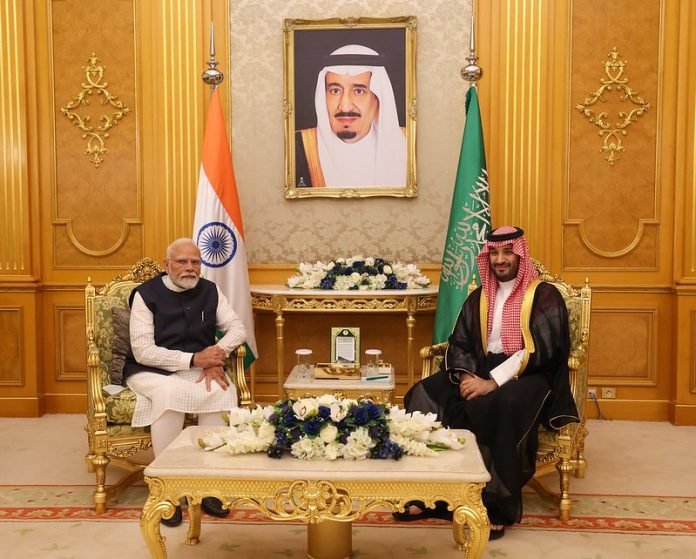Prime Minister Narendra Modi’s Jeddah visit on April 22, 2025, and his meeting with Saudi Arabia’s Crown Prince and Prime Minister Mohammed Bin Salman has strengthened the foundation of Indo-Saudi relations reflective of a growing and enduring strategic partnership. Although Prime Minister Modi had to cut short his visit mid-way due to the ghastly attack on unarmed civilians and tourists in Pahalgam in Jammu and Kashmir, the trip was significant for enhancing the Indo-Saudi resolve to fight terrorism. The visit also emphasised the need to condemn terror and working together to defeat this curse prevailing in all its forms and manifestation, emanating from anywhere in the world.
Resolve to Combat Terrorism
During his interaction with Prime Minister Modi, the Saudi Crown Prince “strongly condemned the ghastly terror attack in Pahalgam and offered deepest condolences over the innocent lives lost.” Moreover, both leaders resolved to ‘combat terrorism tooth and nail’.
Earlier, Prime Minister Modi was welcomed warmly with traditional pomp and show in Jeddah, the commercial capital, the main Saudi port on the Red Sea coast and the gateway to the holy cities of Makkah and Madinah. PM Modi and Crown Prince co-chaired the second bilateral Strategic Partnership Council meeting. They reviewed the progress in strengthening relations encompassing “political, defence, security, trade, investment, energy, technology, agriculture, culture and people-to-people ties.”
The talks also included progress on investments with the High-Level Task Force on Investment (HLTF) reiterating Saudi Arabia’s commitment to invest US$100 billion in India in various sectors such as “energy, petrochemicals, infrastructure, technology, fintech, digital infrastructure, telecom, pharmaceuticals, manufacturing and health.”
During the interaction with Prime Minister Modi, Saudi Arabian Crown Prince Mohammed Bin Salman ‘strongly condemned the ghastly terror attack in Pahalgam and offered deepest condolences over the innocent lives lost.’ Moreover, both leaders resolved to ‘combat terrorism tooth and nail’
The two sides also signed four MoUs, including for cooperation in space activities for peaceful purposes between the Saudi Space Agency and India’s Department of Space. Besides, MoUs were also signed on cooperation in health, anti-doping education and prevention, and inward surface parcel.
During the visit, the Secretary-General of the Muslim World League, Mohammed bin Abdulkarim Issa called on Prime Minister Modi, and condemned the terror attack in Jammu & Kashmir; and offered deepest condolences on the innocent lives lost.
PM Modi’a Third Visit
April 22 visit was the third by Prime Minister Modi who toured the Kingdom in 2016 and 2019 earlier. On the other hand, Crown Prince Mohammed Bin Salman visited India twice in 2019 and 2023. Prime Minister Modi invited the Crown Prince to India for the third meeting of the India-Saudi Arabia Strategic partnership Council meeting.
India-Saudi Arabia relations have flourished in recent years especially as the two countries have decided to elevate ties to comprehensive strategic partnership. Accordingly, the two sides formed the India-Saudi Arabia Strategic Partnership Council during Prime Minister Modi’s visit to the Kingdom in October 2019. The first Leaders’ Meeting of the Strategic Partnership Council was held in September 2023 during the visit of Crown Prince Mohammed Bin Salman to India.
The historical ties between the two countries have thrived in recent years with energy security, expatriates, trade and investments, cultural exchanges and defence and security cooperation forming the backbone of the bilateral ties. The talks focused on strengthening economic cooperation, enhancing cooperation in energy security, accelerating the two-way flow of investments, safety and security of Indian expatriates, Hajj, connectivity including the progress in India-Middle East-Europe Economic Corridor (IMEC), as well as counter-terrorism cooperation, defence and security ties, maritime security, military-to-military ties, joint exercises, defence exports and joint manufacturing.
Economic cooperation forms the most important component of India-Saudi Arabia bilateral relations. Both are G20 economies and both have focused on economic development and growth as their national priorities. Peace and stability are the cornerstones of the foreign policies of India and Saudi Arabia
Economic Ties
Economic cooperation forms the most important component of bilateral relations between India and Saudi Arabia. Both are G20 economies and both have focused on economic development and growth as the national priority. Peace, stability and priority are the cornerstones of foreign policies of both New Delhi and Riyadh. Hence, within the ambit of Saudi Vision 2030 and Viksit Bharat 2047, the two countries have prioritised work on economic growth and expanding external trade and businesses.
In this light, the role of the private sector becomes important. The two-way flow of investments in established and emerging areas, including energy, renewables, petrochemicals, food and agriculture, infrastructure and transportation, information and communication technology, health and pharmaceuticals and sports, entertainment and recreation have emerged as attractive for both public and private companies.

The bilateral trade has continued to grow reaching US$43 billion during financial year 2023-24. Saudi exports to India constituted nearly US$31.4 billion while Indian exports to Saudi Arabia contributed US$11.6 billion in the bilateral trade during the year. Saudi exports comprise petroleum and petroleum products, chemicals and fertilisers, pearls and jewellery, and minerals. Indian exports to the Kingdom include food and food-related products, minerals, automobile and auto parts, and heavy machinery. Notably, the two countries are among the top trading partners of each other with India being the second-largest trade partner of Saudi Arabia and Saudi Arabia being the fifth-largest partner of India.
The two-way flow of investments has witnessed a major increase. Indian investments in Saudi Arabia have reached US$3 billion as of 2023-24 while Saudi investments in India have crossed US$10 billion. The Indian investments are in diverse sectors such as management and consultancy services, construction projects, telecommunications, IT, financial services, software development and pharmaceuticals. On the other hand, Saudi investments in India are in petroleum and petrochemicals, retails and services, finance and food and agricultural products. India has opportunities to attract Saudi investments in health and pharmaceuticals, smart cities, sports and entertainment, retail, IT, telecommunication, civil aviation, and manufacturing.
Energy Security
Energy security forms an important pillar in bilateral relations. India has traditionally relied on Saudi Arabia for long to fulfill its domestic fuel consumption and it has continued despite the diversification of sources of oil imports. Saudi Arabia continues to remain among top oil suppliers to India. The two countries have gradually started expanding energy ties with LNG imports from Saudi Arabia increasing in recent times. Moreover, the two sides have worked to enhance Saudi investments in India’s energy sector. There are also efforts towards enhanced cooperation in the renewable energy sector, such as in solar and green hydrogen, with Saudi Arabia joining the India’s International Solar Alliance and the two sides signing an MoU in the field of Electrical Interconnection, Green/Clean Hydrogen and Supply Chains in October 2023.
Defence and Security Ties
The bilateral defence and security relations between India and Saudi Arabia witnessed significant expansion in recent years. The two counties have similar views on many security concerns afflicting the South and West Asia regions, including terrorism, maritime security, and peaceful resolution of conflicts and disputes. The right to navigation for all in the Red Sea is critical for India given the international maritime route connects India to the Mediterranean and Western Europe.
There has been momentum in defence and military trade between India and Saudi Arabia. Cooperation in defence industries has grown with the possibility of investment, imports and exports, joint manufacturing, exchange of expertise and technological knowhow. Exploring opportunities for furthering cooperation was likely to be the top priority of PM Modi’s visit
Further, military-to-military ties are also important and have witnessed growth in recent years. There has been numerous exchange of visits among the officials and military leaders of the two countries to explore expanding military cooperation. India has also opened its military schools for training of Saudi officers and cadets. Moreover, joint military exercises with all three branches of the armed forces — army, navy and air force — takes place at regular intervals.
Besides, there has been momentum in expanding defence and military trade. Cooperation among defence industries, including the possibility of investments, imports and exports and joint manufacturing and exchange of expertise and technological knowhow. Exploring opportunities for furthering defence and security cooperation are therefore likely to be among the top priority in the talks during the prime minister’s visit.
Conclusion
The visit of Prime Minister Modi to Saudi Arabia has been significant and has strengthened the bilateral relations and strategic partnership between the two countries. For India, Saudi Arabia is one of the most important partners in the Gulf and Middle East region. Likewise, India is at the heart of Saudi Arabia’s ‘Look East’ policy. The bilateral ties are likely to grow further in trade, investment, energy, defence and security, and counterterrorism cooperation. The visit enhanced the resolve of both sides to work together on developmental plans such as Saudi Vision 2030 and Viksit Bharat 2047 with ample opportunities to collaborate in businesses and the private sector. Energy, petrochemicals, renewable, entertainment, sports, cinema, cricket, mining, logistics and infrastructure are the attractive sectors.
The visit has worked towards creating an enduring relationship within the framework of the Indo-Saudi Strategic Partnership Council. The visit was also important as it came at a time of great regional turbulence and uncertainty in the international politics. Saudi Arabia and India are G20 members and have similar views on regional and global issues such as the crisis in Ukraine and Gaza, and have called for peaceful and negotiated solutions and respect for sovereignty of all countries.
–The author is an Associate Professor of Middle East Studies at Jawaharlal Nehru University, New Delhi. The views expressed are personal and do not necessarily reflect the views of Raksha Anirveda













